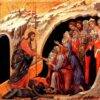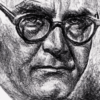Tag: Universalism’
How the Inscrutable unReality of Darkness Keeps Barth and the Athanasian Reformed from Incoherence and a Dogmatic Christian Universalism
I want to talk about God’s shadow side. The rip against Thomas Torrance, Karl Barth and the Athanasian Reformed is that their respective doctrine of election leads to some form of Christian universalism (some are okay with that). But in fact, it doesn’t. People like Keven Vanhoozer, Robert Letham, Roger Olson et al. have critiqued Torrance, Barth, and Evangelical Calvinists, like myself, with reference to what they take to be our theological Achilles heel. Because they think from within an Aristotelian or Stoic theory of causation in a God-world relation, they cannot imagine how the Evangelical Calvinist, after Barth, Torrance…
Jesus and Bobby on Christian Universalism
I just came across a Tweet from some random person that stated (my paraphrase): “I no longer believe in an eternal unending hell.” He said: “I understand why some still do, but why do so many who do act is if they are excited about it; as if it’s a sign that they were right, and those who rejected Christ were wrong and now will pay for it in an eternity of unending, hopeless torment?” So, of course, we are referring now to Christian universalism (CU). CU has been growing some serious legs over the last two decades, and even…
On Barth’s and Paul’s Purported ‘Christian Universalism’ in Sachkritik
Karl Barth is often said to be a proponent of Christian universalism. The logic is that Barth’s doctrine of election, whether he likes it or not, commits him to affirming some form of a Christian universalism (i.e., the notion that all people of all time will eventually freely submit to the reality that Jesus Christ is Lord; even if that finally only happens in hell itself). But Barth adamantly rejected this supposed necessity of his theological trajectory. As Douglas Campbell writes: Barth has often been accused of universalism, but he steadfastly denied it (see the final paragraph of CD III/2),…


